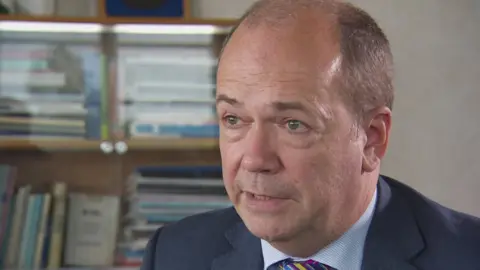Suicides: Plan revealed to reduce number of deaths
 Getty Images
Getty ImagesA plan has been unveiled to reduce Northern Ireland's suicide rate by 10% in the next five years.
The commitment is contained in the long-awaited Protect Life 2 suicide prevention strategy published by the Department of Health.
Chief Medical Officer Dr Michael McBride said: "There is no bigger public health challenge."
Northern Ireland has the highest suicide rate in the UK, with five people dying each week.
The strategy aims to dispel the myths around suicide, including the suggestion that most happen suddenly and without warning.
Instead it states early intervention can make a real difference.
Additional funding
Among the 10 objectives and 44 actions is ensuring suicide prevention services and support are delivered appropriately in deprived areas where suicide and self-harm rates are highest.
The strategy secured cross-departmental support and additional funding of £1.35m through the transformation programme.
That brings the total funding on suicide prevention in this financial year to more than £9m. Charities had hoped there would be at least £3m in additional funds.
The document states that full implementation of the strategy will require additional funding in the future.
Dr McBride told BBC News NI there needs to be a refocus and applauded the joint departmental approach.

"There is no bigger public health challenge. There is nothing more important than us making progress in reducing deaths by suicide and reducing rates of self-harm in Northern Ireland which does not compare favourably with other parts of the UK," he said.
"We've made significant strides, we need to refocus and we need to do more."

Stark figures
- Three times as many people die by suicide in Northern Ireland each year than are killed in road traffic collisions
- A total of 219,000 people have been directly affected by suicide since 2005
- More than 70% of people who die by suicide are not known to mental health services
- 10% of 15/16 year olds have self-harmed at some stage

Richard Pengelly, the permanent secretary of the Department of Health, said suicide levels were unacceptably high.
"How we address this is a challenge for all in government and society. I am pleased that permanent secretaries across the civil service have indicated their support for this strategy," he said.
Dr Michael McBride added: "The multi-agency triage team is working in partnership with the health and social care sector, PSNI and the Northern Ireland Ambulance Service to provide on-the-spot mental health support to people who are in distress.
"This programme has been expanded and is now available in the Belfast and South Eastern Trust areas."

Where to get help
If you are in the UK, you can call the Samaritans on 116123 or Lifeline on 0808 808 8000.

In addition, a Towards Zero Suicide initiative has recently been introduced in all of Northern Ireland's health trusts with a focus on patient safety in adult mental health.
Protect Life 2 builds on the original strategy and contains a range of new initiatives.
Long-term goals
According to mental health charities the strategy actually can make a difference as it defines the government's long-term goals and sets out in black and white how it plans to achieve them.
It also means there is direction from the very top, including a financial commitment and, most importantly, ensures services are rolled out across NI.
The Conservative/DUP confidence-and-supply funding allocated a total of £50m across five years. Local mental health charities say there's little evidence of this money on the ground.
 Getty Images
Getty ImagesDeprivation
The suicide rate in the most deprived areas of Northern Ireland is almost twice the NI average and is three-and-a-half times the rate in the least deprived areas.
Almost 28% of adults living in the most deprived areas of Northern Ireland are on prescription medication for mood and anxiety conditions.
Men in their late teens to mid-50s are the most at-risk group in society and the risks increase further for men who are single, unemployed, and living in socio-economic disadvantage.
The strategy aims to target those who self-harm and their families, those who are in emotional crisis or who are already suicidal and their families.
It also plans to bring more services into the community - especially into hospitals.
